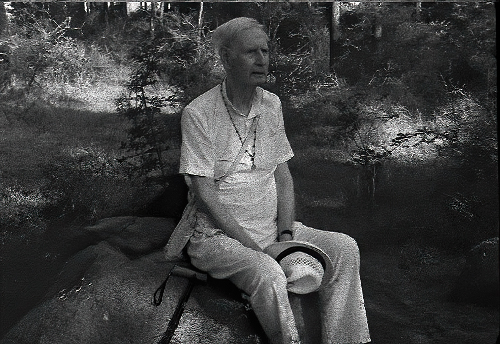A student of the teachings of Nisargadatta Maharaj who was also a friend of Jean Dunn (the editor of a number of his books) has kindly submitted a PDF of her ‘diaries’ for free download. Here is his introduction:
Jean Dunn was an American woman who lived for some years in Tiruvannamalai, India, where Ramana Maharshi’s ashram is, by the foot of the sacred mountain Arunachala. She was devoted to Ramana Maharshi and followed his teachings. In 1977, after numerous invitations to go to meet the great sage, Sri Nisargadatta Maharaj, (who became known through the book of dialogues titled “I Am That”), she finally made the trip from southern India to Bombay and met the man whom she recognized as her Guru.
These journals are the notes she made during the time she was with Sri Nisargadatta Maharaj.
These are the complete journals of Jean Dunn from 1977 to 1981, in which she writes in detail of her time with Sri Nisargadatta Maharaj. It includes dialogues that Jean and others have had with Maharaj that have never before been published. Copies of these journals have been informally and freely circulating for decades, among those who are students and practitioners of Advaita Vedanta.
Besides being of particular interest to those who have met Nisargadatta Maharaj, (or to those who have met others in the Inchigiri Navnath tradition that Nisargadatta Maharaj belonged to, such as Ranjit Maharaj and Ramakant Maharaj), it is also of value and interest to the many who have been inspired by “I Am That”, and the three books of dialogues with Nisargadatta Maharaj, which Jean Dunn edited. Nisargadatta had the highest regard for Jean Dunn, and her devotion to him and the teachings, and their palpable impact on her, shine forth in these journals.
After Nisargadatta Maharaj’s passing, and on his authorization, Jean would meet with, and give guidance to those who would come to her, sharing the wisdom and grace that flowed through her, in her words, her silence, and her whole way of being. This edition of Jean’s Journals is complete, and unaltered. Nothing is left out from the original manuscript that has been circulating widely among students of advaita from various traditions. As in the original edition, this edition includes the article that Jean wrote on Nisargadatta Maharaj that was published in the Mountain Path magazine in the October 1978 issue, and also includes the interview with Jean done by Malcolm Tillis which was published in his book “Turning East”.
Here is the link to the download (467K).

